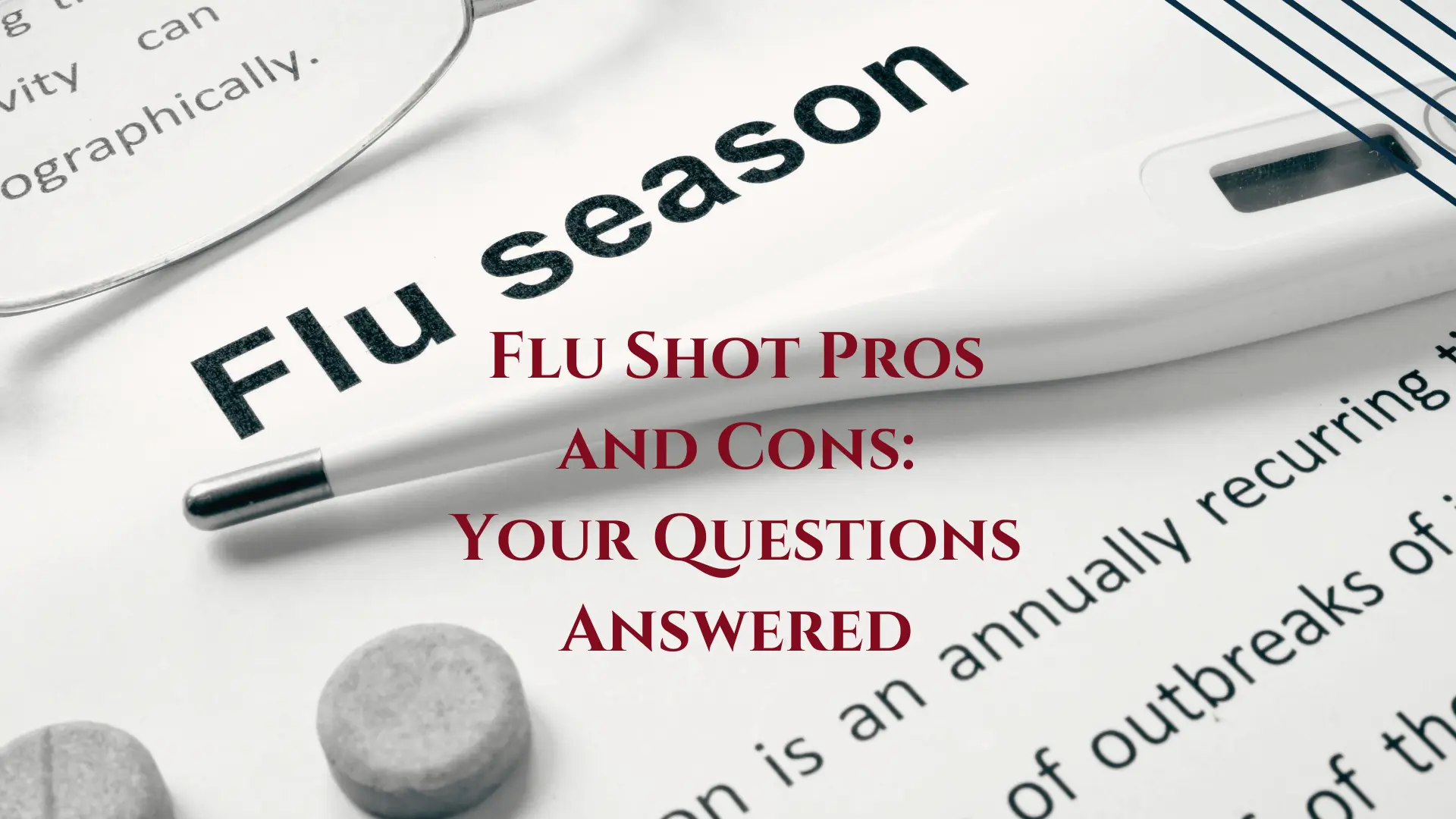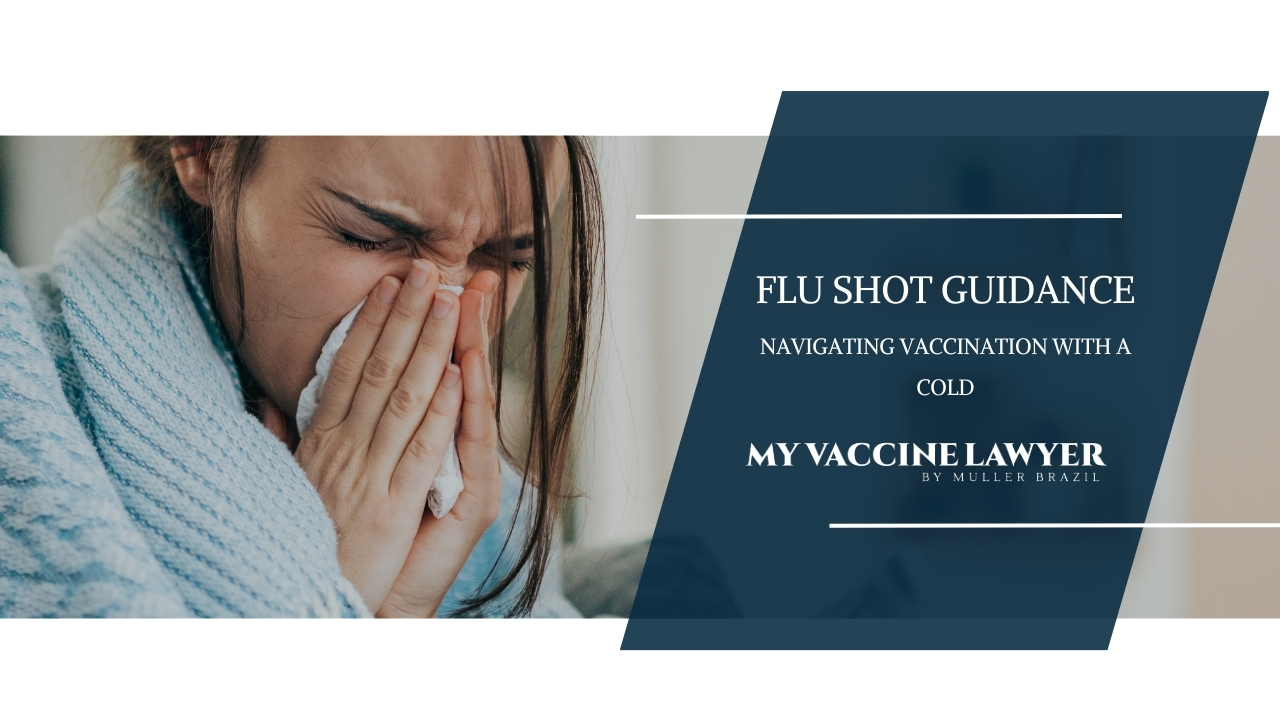Flu Shot Lawsuits - What You Need to Know for Compensation
If you've suffered shoulder pain or Guillain-Barre Syndrome, after getting a flu shot vaccination, you may be eligible for compensation through the...
About Us
Vaccine Injury Lawyer
Types of Injuries
All Covered Vaccines
7 min read
Vaccine Injury Law Resources / Flu Shot / Flu Shot with a Cold? Expert Advice on Vaccination Safety
 Paul Brazil
:
Feb 8, 2024 12:00:00 PM
Paul Brazil
:
Feb 8, 2024 12:00:00 PM
There can occasionally be some confusion with the question, “Can I get a flu shot if I have a cold?” Most often, the answer is yes.
A mild cold doesn’t usually interfere with the flu vaccine’s effectiveness. However, timing is key; for moderate to severe symptoms, it’s best to wait until recovery.
This article explores the relation between cold symptoms and flu vaccinations, including expert guidelines and when to hold off on that flu shot.
Flu shots, or influenza vaccines, are our best defense against influenza, a contagious respiratory illness resulting from an influenza virus infection. The flu can be a mere inconvenience for some, but for others, it can turn into a severe illness that could lead to hospitalization, or in extreme cases, death. Getting a flu shot is a proactive measure to prevent not just the flu but also the serious complications that might arise from it.
Developers create the annual flu vaccine to protect us against influenza strains predicted to dominate the forthcoming flu season. The notorious ability of the influenza virus to mutate requires a yearly update of the vaccine. The flu shot works by helping your immune system generate antibodies against specific viruses, offering a protective shield against potential influenza virus infection.
Different flu vaccines are available, including Flucelvax®, Flublok®, and Fluzone® High-Dose. Your individual health status and availability influence the choice of vaccine; thus, you should mention any severe allergic reactions to previous flu vaccines or their components to your healthcare provider.
Flu vaccination is not just about protection but also about reducing the risk of flu-related complications, hospitalizations, and deaths. It reduces the probability of flu-linked hospitalizations, offering notable advantages to high-risk demographics such as individuals with heart disease or those aged 65 or above.
Simply put, a flu shot is vital for maintaining health throughout the flu season, particularly for those prone to severe illness. This readily available preventive vaccine aims to protect us with the seasonal influenza vaccine.
.jpg?width=2240&height=1260&name=MVL%20template%20(11).jpg)
The flu shot produces an immune response by using inactivated or weakened viruses, offering protection against particular strains of the virus without creating the disease. It’s like a mock drill for your immune system, preparing it for a real flu virus encounter.
The available types of flu vaccines for protection include
Yearly vaccination comes from the post-vaccination gradual decline in the body’s immune response and the ongoing mutations of flu viruses.
The big question still remains: Can you get a flu shot if you have a cold? Generally, it is considered safe to receive a flu shot while experiencing a mild illness like a common cold. Mild symptoms are unlikely to affect the effectiveness of the flu shot. Even if you have a mild cold, your immune system is generally able to respond effectively to the flu vaccine.
On the other hand, if you are dealing with a moderate or severe illness, you are advised to wait until you have recovered before receiving a flu shot. Your body’s ability to mount a strong response to the vaccine and develop immunity is vital, and this may be compromised if the immune system is already battling a significant illness.
In summary, a mild cold typically does not stop you from getting your flu shot, but severe illnesses may require a temporary halt to your vaccination plans.
The Centers for Disease Control and Prevention (CDC) provides specific recommendations when it comes to flu vaccination timing during an illness. They advise waiting until the fever diminishes and other symptoms improve before receiving a flu shot.
A fever often signifies an ongoing battle by your immune system against an infection. Waiting until your fever subsides allows your immune system to produce a stronger antibody response to the vaccine.
When it comes to distinguishing between a common cold or sinus infection and more severe illnesses, some symptoms can help you make the call. Mild cold symptoms such as a runny nose or sore throat are typically not a concern for flu vaccination.
On the contrary, more severe illness symptoms when considering postponing a flu vaccination include a high fever, substantial muscle aches, and breathing difficulties, particularly if these symptoms manifest during recognized flu outbreaks.
Deciding to get a flu shot during a cold requires careful consideration of several key factors, including the severity of your symptoms. Mild symptoms from a cold are not usually enough to delay getting your flu shot. However, if your symptoms are moderate to severe, it could indicate that your immune system is already busy fighting off an infection, and this could potentially impact the vaccine’s efficacy.
You might consider postponing your flu shot if you’re dealing with severe symptoms such as high fever, severe diarrhea, vomiting, coughing up phlegm, profound fatigue or malaise, or experiencing a severe allergic reaction, especially if you have had a prior severe allergic reaction.
The reasoning for waiting until your health improves before vaccination is that a recuperated body creates a better immune response to the vaccine. The aim is to equip your body with the best possible defense against the flu.
It’s important to distinguish between mild and severe symptoms when it comes to the severity of symptoms. Typical mild symptoms of a cold include:
If you’re experiencing more severe symptoms, postponing your flu shot is generally advisable. While it’s generally considered safe to receive a flu shot with moderate or severe cold symptoms, the presence of more severe illnesses could potentially impact the vaccine’s effectiveness.
Your immune system’s response can greatly influence the timing of your flu shot. An illness-weakened immune system might lower the flu vaccine’s effectiveness, reinforcing the need to wait until your health improves.
The immune system stimulates a protective, long-lasting immune response to future infections, which is essential for the flu vaccine's effectiveness. Interestingly, the presence of a cold does not automatically reduce the potency flu shot; receiving the vaccination may increase your immune response.
There’s an alternative to the traditional flu shot: the nasal spray flu vaccine. This vaccine is available as an alternative option for non-pregnant individuals aged 2-49 years old. It is made with weakened live viruses that are intended to stimulate an immune response without inducing the disease. The seasonal flu vaccine can be administered through either the flu shot or the nasal spray flu vaccine.
If you are moderately or severely ill, receiving the nasal spray flu vaccine is not advised. Similar to the traditional flu shot, you should postpone vaccination until recovery.
While it’s generally safe, the nasal spray flu vaccine may cause adverse effects such as runny nose, wheezing, and vomiting in children, and adults may experience symptoms like a runny nose, cough, or sore throat.
There are special considerations for high-risk groups when it comes to getting a flu shot with a cold. High-risk groups include the elderly, pregnant women, and those with chronic health conditions. They are considered high-risk due to their vulnerability to developing severe complications from influenza.
If you belong to these high-risk groups and you’re thinking about getting a flu shot during a cold, seek advice from your healthcare provider before proceeding. Specifically for pregnant women, it’s recommended to hold off on the flu shot until the cold subsides.
Whenever you’re uncertain, it’s best to consult your healthcare provider. If you’re uncertain about the safety of getting a flu shot while ill, they can offer personalized advice based on your specific health condition.
Your healthcare provider will assess the severity of your cold symptoms to weigh the potential risks and benefits of receiving a flu shot. Based on this assessment, they will guide you on whether to go ahead with the shot or wait until your condition improves.
To sum it up, getting a flu shot during a mild cold is generally safe. However, if you’re dealing with a more severe illness, it’s best to wait until you’ve recovered. The timing of your flu shot can significantly impact its effectiveness, and it’s crucial to give your body the best shot at building a strong defense against the flu.
When in doubt, always consult your healthcare provider for personalized advice. Remember, getting vaccinated protects you and contributes to community immunity, keeping those around you safe as well.
Take Control of Your Injury Today
While getting a flu shot while having a cold is generally safe, the severity of your symptoms may be a factor. Generally, mild cold symptoms shouldn't impact the efficacy of the flu shot.
It is recommended to wait until you have fully recovered before getting the flu shot, especially if you are moderately or severely ill. Follow your healthcare provider's advice on when to schedule the vaccination.
Yes, you can still get your flu shot if you have bronchitis, as long as you have a mild illness without a high fever. However, if you have a moderate to severe illness, it's best to wait until you've recovered. If you have any doubts, consult your healthcare provider.
Valid reasons to decline the flu shot include thinking it's unnecessary, fear of side effects, allergy to the vaccine, and belief that it's not good for one's health. Source: CDC.
No, you cannot get the flu from a flu shot because the viruses in the flu shot are killed (inactivated). Some minor side effects, such as soreness and headache, may occur.
Paul Brazil is a native of Dunmore, Pennsylvania and a graduate of Dunmore High School. For his undergraduate education, he attended Bloomsburg University where he majored in political science. He then went on to earn his JD from Widener University School of Law. Following graduation from law school, Mr. Brazil worked at a large Philadelphia civil defense firm where he litigated workers’ compensation claims and Heart and Lung Act cases. In 2012, he joined with his coworker Max Muller to form Muller Brazil.

If you've suffered shoulder pain or Guillain-Barre Syndrome, after getting a flu shot vaccination, you may be eligible for compensation through the...

"The upside of the flu shot is that it can prevent many strains of the flu, which can be a debilitating and sometimes deadly disease. The downsides...

If you're thinking about getting a flu shot, it's good to know that Guillain-Barré Syndrome (GBS) is a very rare side effect, occurring in only about...
